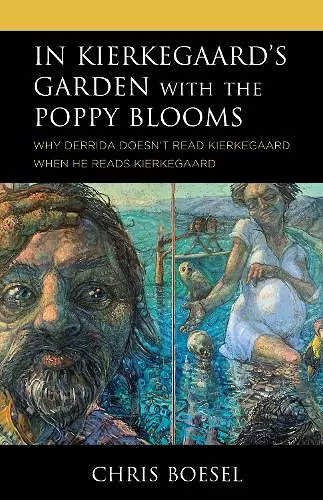In Kierkegaard's Garden with the Poppy Blooms
Why Derrida Doesn't Read Kierkegaard When He Reads Kierkegaard
Format:Hardback
Publisher:Rowman & Littlefield
Published:27th Jul '21
Currently unavailable, and unfortunately no date known when it will be back

Chris Boesel invites readers into a Kierkegaardian style literary conceit, creating two pseudonymous voices—one philosophical and deconstructive, one theological and confessional—in order to stage an encounter between two commentaries on Kierkegaard's Fear and Trembling. On one level, the contest between the two commentaries demonstrates the extent to which an encounter between deconstruction and Kierkegaard has not taken place in the one place everyone thinks it has, in Derrida’s reading of Fear and Trembling in The Gift of Death. On a deeper level, Boesel argues that Derrida’s misreading of Fear and Trembling is both source and symptom of a wider problem: an apophatic blind spot in deconstructive engagements with Christian theology in philosophy of religion and postmodern theology. This blind spot erases the theological and ethical possibilities of what Boesel calls a Kierkegaardian confessional faith, possibilities rooted in a “deconstructive deconstructibility” that produces its own deconstructive-like effects. As a corrective to this blind spot, the pseudonymous encounter between deconstruction and Kierkegaard staged here shows how these effects do the very things heralded by self-proclaimed apophatic remedies of “confessional faith”: disrupt human mastery over God and neighbor while calling for concrete commitments to justice for the widow, orphan and stranger.
Deconstruction is justice. Or maybe not. In a provocative and yet witty book, Chris Boesel invites us to consider the problems with a deconstruction that doesn’t turn its critical lens upon its own progressivism. Offering Kierkegaardian Christianity as a constructive alternative, Boesel argues that we need an actual God defined by embodied relational love if we are to go beyond mere structural logics of alterity and begin to care for the widows, the orphans, and the strangers in our midst. No one is safe from this book. But we are all better because of it.
-- J. Aaron Simmons, Furman UniversityA compelling analysis and argument for the claims 1) that deconstruction is too formal to provide any warrant for the secular, left-wing politics of Derrida and many of his admirers, 2) that Derrida is a poor reader of Kierkegaard, and 3) that properly understood, deconstruction can help a confessional Christian theology with Kierkegaardian overtones to maintain a proper humility. The form of presentation makes the reading easy and fun.
-- Merold Westphal, Fordham UniversityBoesel has managed to write a book that is at once meticulous and light-hearted, both generous and uncompromising. It makes a strong case for the confessional Kierkegaard who makes so many philosophers twitchy, forcing what one might call a genuine decision about this notoriously slippery thinker. Whether the argument delights or offends you, it will challenge and impress you.
-- Mary-Jane Rubenstein, Wesleyan UniverISBN: 9781978706514
Dimensions: 236mm x 163mm x 30mm
Weight: 680g
330 pages